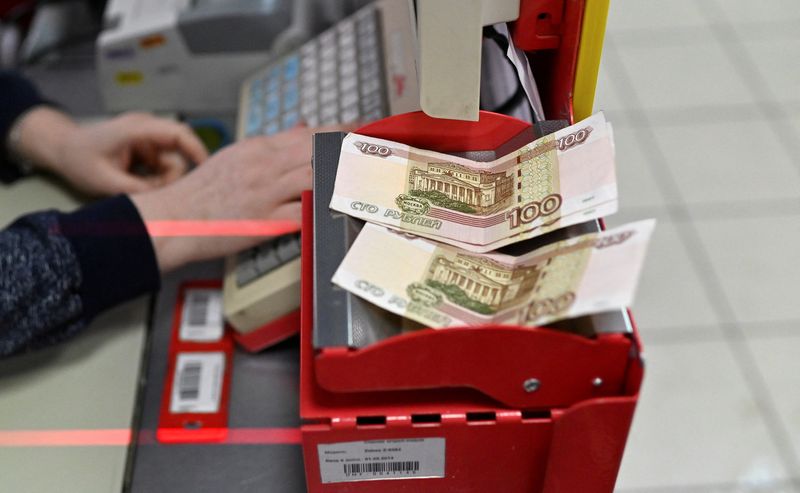MOSCOW (Reuters) - Analysts have trimmed their year-end inflation forecasts for Russia and see room for the central bank to continue cutting rates as it tries to blunt the impact of major sanctions, a Reuters poll suggested on Friday.
Russia's economic landscape changed drastically after Moscow sent tens of thousands of troops into Ukraine on Feb. 24, triggering sweeping Western restrictions on its energy and financial sectors, including a partial freeze of Russian reserves, and leading scores of companies to exit the market.
The average forecast among 17 analysts polled in late July suggested the Russian economy was on track to shrink by 5% this year. A similar poll in June had predicted a contraction of 7.1%.
Analysts' forecasts are becoming less pessimistic as officials revise their outlooks and fresh statistics arrive. Data published this week showed industrial output, real disposable incomes and retail sales all fell in year-on-year terms in June, although the unemployment rate stayed at a record low.
The economy ministry in April said gross domestic product could fall by more than 12% this year, in what would have been the biggest contraction since the mid-1990s, but forecasts have softened since then as Russia pushes back against restrictions.
The rouble soared to over seven-year highs in late June, supported by capital controls Moscow introduced to shield its financial system from sanctions, as well as Russia's strong current account surplus due to high prices for commodity exports and falling imports.
But the currency is seen weakening in coming months as the government is expected to take steps to curb its strength.
The rouble is expected to trade at 75.00 against the dollar in a year from now, according to the poll, compared with a rate of 75.73 predicted by analysts in late June. Friday's official rate was at 60.20 roubles per dollar.
Inflation, one of the key concerns among Russian households, is expected to accelerate to 13.4%, from 8.4% in 2021, according to the poll, but below last month's expectations of a 14.5% annual consumer prices increase.
The central bank said inflationary expectations among Russian households declined in July, which may give it room to cut rates further to provide the stranded economy with cheaper lending.
"A strong rouble and the economic decline will contribute to a further slowdown of inflation," said Mikhail Vasilyev, chief analyst at Sovcombank, who forecast a 50-basis-point cut to 7.5% at the next rate-setting meeting on Sept. 16.

The consensus forecast suggested the central bank would cut the rate to 7% by year-end from 8% at the moment.
In January, before the conflict in Ukraine began, analysts had on average expected the economy to grow by 2.5% with year-end inflation at 5.5%. Russia targets inflation at 4%.